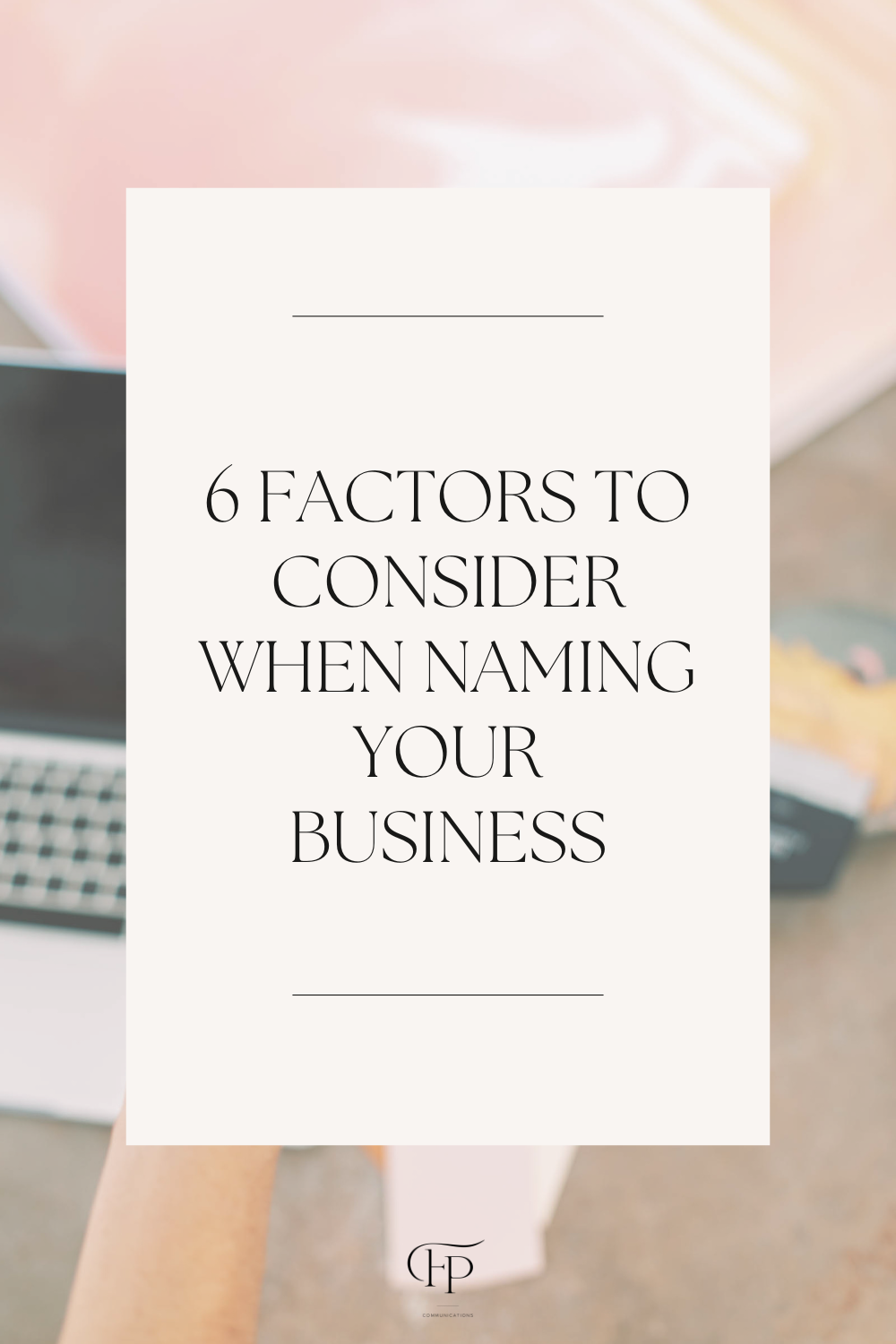6 factors to consider when naming your business
Disclaimer: The example names mentioned in this article are used for purely educational purposes and Fresh Pages is not affiliated with them in any way. Also, as a linguist I’ve included occasional nerd tips that might help you decide on your name, but they may or may not work for everyone.
Deciding on a name — one of the most fun things about starting your own business! And yet it can also be a source of sleepless nights and much teeth-grinding (I would know), because you just can’t seem to get it right.
We’d all love to have that lightbulb moment when the perfect name just magically appears in our head. But more often than not, the right name doesn’t arrive by inspiration — it’s carefully thought out and planned. Here are six things you should consider when naming or re-naming your business.
1. Do you want it to be a personal brand?
Should you just use your name? We do see plenty of successful personal brands around that are associated with the entrepreneur’s name, like Jenna Kutcher and Ashlyn Carter.
If you choose to use your name, the biggest pro is that it’ll be unique, and you can use your personality to build it up. This works great for extroverts and anyone with a larger-than-life personality, as well as influencers and bloggers.
If the thought of having your name out there makes you want to dry heave, or if you would prefer not to be directly associated with what you do (perhaps if you’re still in a 9-5 and putting your name out there might not sit so well with your employer), then it might be better to use a more generic name for your business that’s not your own.
2. What long-term plans do you have?
What’s your vision for your business — are you content to stay where you are, or do you have grand plans to evolve it into an agency or collective? This decision may influence your name, because you want to keep it broad enough to fit that eventual form your business will take.
For example, if you’re a photographer who wants to eventually turn your business into a full wedding boutique with multiple services, it might be better to name your business “Wildflower Weddings” instead of “Wildflower Photography”.
If you’re going this route, you can also consider appending a “&co” or “collective” or “studio” to the end of your business name. This is partly the reason I went with freshpages.co — the “co” stands for “communications” for now, but there’s room to change it to “collective” in future if I decide to evolve into an agency, without having to change my name or website address.
3. Does it convey what you do to your ideal client?
Sometimes, what seems like the perfect name to us may be confusing to the outsider, because they don’t share the same inside knowledge and perspective that you have. One of the earliest names I fell in love with for this business was “Paper Plane”, because to me, it was playful, lighthearted and a great metaphor for sending a message across.
When I polled my group of friends — who were also women entrepreneurs who had been in business for a while, and therefore my ideal client — they unanimously said that it was cute, but that it didn’t sound like I took myself seriously enough.
So that idea went into the bin (pun fully intended), and Fresh Pages later came along and was fully approved.
A good starting place would be to first develop your ideal client avatar, then think of a name that might appeal to them. (By the way, I’ve learned this the hard way: when testing out a name, don’t ask your husband or mom, unless they fall into your ideal client category.) Look for friends or Facebook groups of people who are your ideal client, and ask them. Their perspective will offer you insight into what your ideal client really thinks of you.
BONUS NERD TIP: If possible, use words that have a positive connotation, because they create a stronger emotional connection with people. Connotations evolve with the times, so avoid ultra-trendy ones — for example, words that ended with z used to be really popular and cool in the early 2000’s (remember Bratz dolls?) , but are definitely cringe-inducing now.
4. Is it already commonly used?
Here’s where my original “Paper Plane” name also crashed: it was already so commonly used by other creatives. There’s a Paper Plane Studio that does invitations and stationery, another that does web design, and another that does branding.
Another idea I had was The Brand Edit, but that had also been taken by someone else who was doing web design (and doing a dang good job of it). It wasn’t communications like I was doing, but it was close enough to result in potential confusion for clients.
Do a quick search of your ideal name and check. Is someone else already using it? Is their business too similar to yours? If the answer is yes, don’t use that name — not only will you have to fight them in the Google rankings and confuse customers who search for you, you’re also putting yourself at risk of future legal complications.
5. Is it easy to pronounce and spell?
I was in the lift with a fellow business owner who was commenting that they knew of a florist who lived near me.
“What’s their name?” I asked.
“Ah, I can’t remember, it’s too complicated,” he said.
Later I did a search and finally came across the name: a five-syllable Russian-sounding name that looked like it had meant to impress, but so difficult to pronounce and spell that I can’t remember it to this day.
There is no faster way to kill a brand than to have an unpronounceable name that people can’t remember, or mistype into the URL bar.
Yes, complex or exotic words may sound fancy, but they may work against you instead of helping your brand appear more premium.
Names should be simple, memorable, and easy to pronounce and spell. Case in point: Apple, Nike, Pepsi and other big brands have simple names that are easy to remember.
BONUS NERD TIP: Having a plosive sound in your business name has been said to help it sound more memorable and assertive. Plosives are sounds with b, p, t, d, k or g in them. These are created with a forceful expulsion of air when we say them. Consider ‘Coca Cola’ — the ‘k’ sounds are very definite and make the name stand out. (And now I’m thirsty.)
6. How does it sound in a URL or Instagram handle?
Finally — how does your chosen name look when squished together in a URL? Is it still clear, or can it be mistaken for something else? A name like Pen Island for a stationery shop might sound great on its own, but rather unfortunate when typed into a URL without spaces and uppercase letters for definition.
BONUS NERD TIP: If your name is made up of two words or more, one thing that will help is a clear boundary between them. In the English language, there are letters that will never or rarely appear together in one word — ‘sh’ and ‘p’ for example, or ‘d’ followed by ‘l’. Or ‘s’ followed by ‘r’. Very generally speaking, these start and end with consonants.
When put together into a URL, words with clear boundaries are easier to remember because the brain is less likely to confuse them for another set of words. For example, tripzilla.com sounds less confusing than tripescape.com.
Slightly overwhelmed? I’m always happy to give advice — just shoot me an email at mel@freshpages.co. Ultimately, while a name is important, it’s not permanent, and can always be changed as your business grows over time.
Did you enjoy this post? If you did, don’t forget to subscribe below for more tips like this delivered to your inbox!
the author
Hi, I’m Melody! I help creative entrepreneurs make money by streamlining their communications and building a brand that their clients like and trust.





